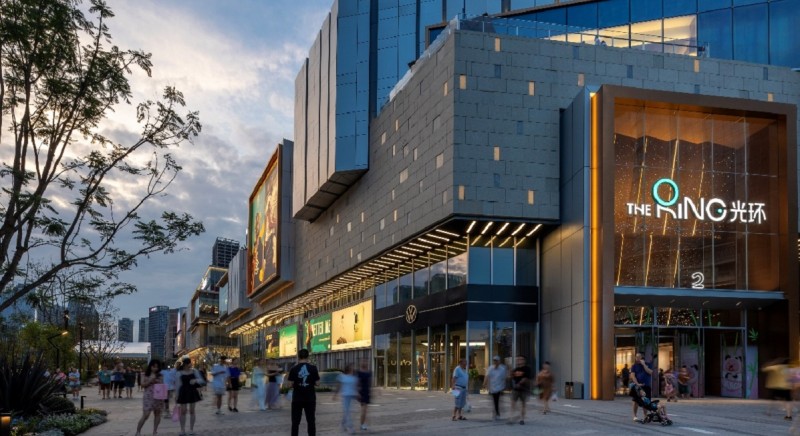Of the US$11.5 billion, the land and development costs were about US$4.3 billion and US$9 billion, respectively. The total constructed floor area will be 3 million sq m, comprising 240,000 sq m of retail space, 650,000 sq m of Grade A offices, 160,000 sq m of high-end waterfront luxury residences, two hotels operated by Mandarin Oriental Hotel Group (55,000 sq m) and over 50,000 sq m of cultural and art venues.
HKL’s largest-ever single investment
“West Bund Central is the group’s largest ever single investment and underlines our strong and enduring commitment to Shanghai and China. It also epitomises our strategic pivot to focus on developing ultra-premium integrated properties in Asia’s gateway cities,” HKL group CEO Michael Smith said on Nov 28.
The Westbund Orbit — a public art and event centre designed by world-renowned architect Thomas Heatherwick and launched in March 2024 — has hosted over 20 top-tier fashion, arts and music events and conferences, with more than 70% debuting in China for the first time.
The first phase of The Central Residences West Bund (Blocks A & B) has been completed, with over 97% of the 183 apartments leased.
See also: Alibaba leads tech slide after Pentagon briefly shows blacklist
Mandarin Oriental Hotel Group will launch 300 serviced apartments next year. The site will feature two Mandarin Oriental hotels.
The first phase of Westbund Central’s retail offering opened last year. Adjacent to Blocks A & B of The Central Residences, it covers a total gross floor area of 10,000 sq m and focuses on urban wellness. The site will eventually include a Waterfront Mansion destination featuring luxury brand maisons and Asia’s first Landmark Retail Avenue, extending 1.2 km and offering more than 600 brands. This will be complemented by The Bund Collection of 180 F&B outlets.
“The first component of West Bund, the group’s mega-development in Shanghai, was completed in 2024 with resounding success, as 80 luxury residential units were handed over to buyers in 2024. These ultra-premium residential units were sold at prices among the highest in the Shanghai primary residential market. Completion of the other components is expected to occur in phases from 2025 to 2027,” said HKL chairman John Witt in prepared remarks on March 10 when releasing its FY2024 ended Dec 31, 2024 results.
See also: China summons Alibaba, other platforms over pricing practice
Separately, in June last year, HKL invested US$400 million to upgrade its Landmark retail portfolio over a three-year period, with phase one starting last year. HKL’s retail tenants committed additional capital investments of US$600 million in Landmark.
Capital recycling plans revealed
During the results briefing on March 10, Smith also gave further details on the group’s recycling plans. By 2035, HKL will have recycled US$10 billion of assets, of which US$6 billion will be development property and US$4 billion investment property.
Smith said HKL plans to recycle US$6 billion by 2027. Out of this US$6 billion, build-to-sell in China is approximately US$2.5 billion, non-core retail in China accounts for US$3 billion, and residential property in Indonesia and Singapore accounts for around US$1 billion.
“The Ring mall in Chongqing is trading at a very good yield on cost and at a level we can divest at. Some we will have to wait for leasing cycles. Our office in secondary markets is the most challenging,” Smith said. “For The Ring series we built, we are more confident they are at a level we can trade out of.”
On the build-to-sell front in China, HKL had a number of successful projects that were fully sold. This enabled HKL to monetise US$290 million of assets with a further US$10 million from recycling a retail asset in Thailand. The money were used to lower debt by 5% and raise dividends by 6%. Up to 20% of proceeds from capital recycled will be used for future buybacks, Smith said.
HKL’s strengthened “bench strength” includes investing “in people to unlock and realise potential”. Michelle Ling, who played a major role in the privatisation undertaken by Cuscaden Peak when she was at Mapletree Investments, is HKL’s new chief investment officer. HKL has a target of US$100 billion in assets under management by 2035.
Following HKL’s strategic review last year, Smith announced that the group will remain focused on prime investment property assets in Hong Kong, Singapore and Shanghai.
“Phase one primarily focuses on the recycling of capital and establishment of deal sourcing and fundraising capabilities. Further phases involve the deployment of capital into long-term prime properties investment opportunities, accompanied by active capital recycling and third-party capital initiatives,” Witt said.




